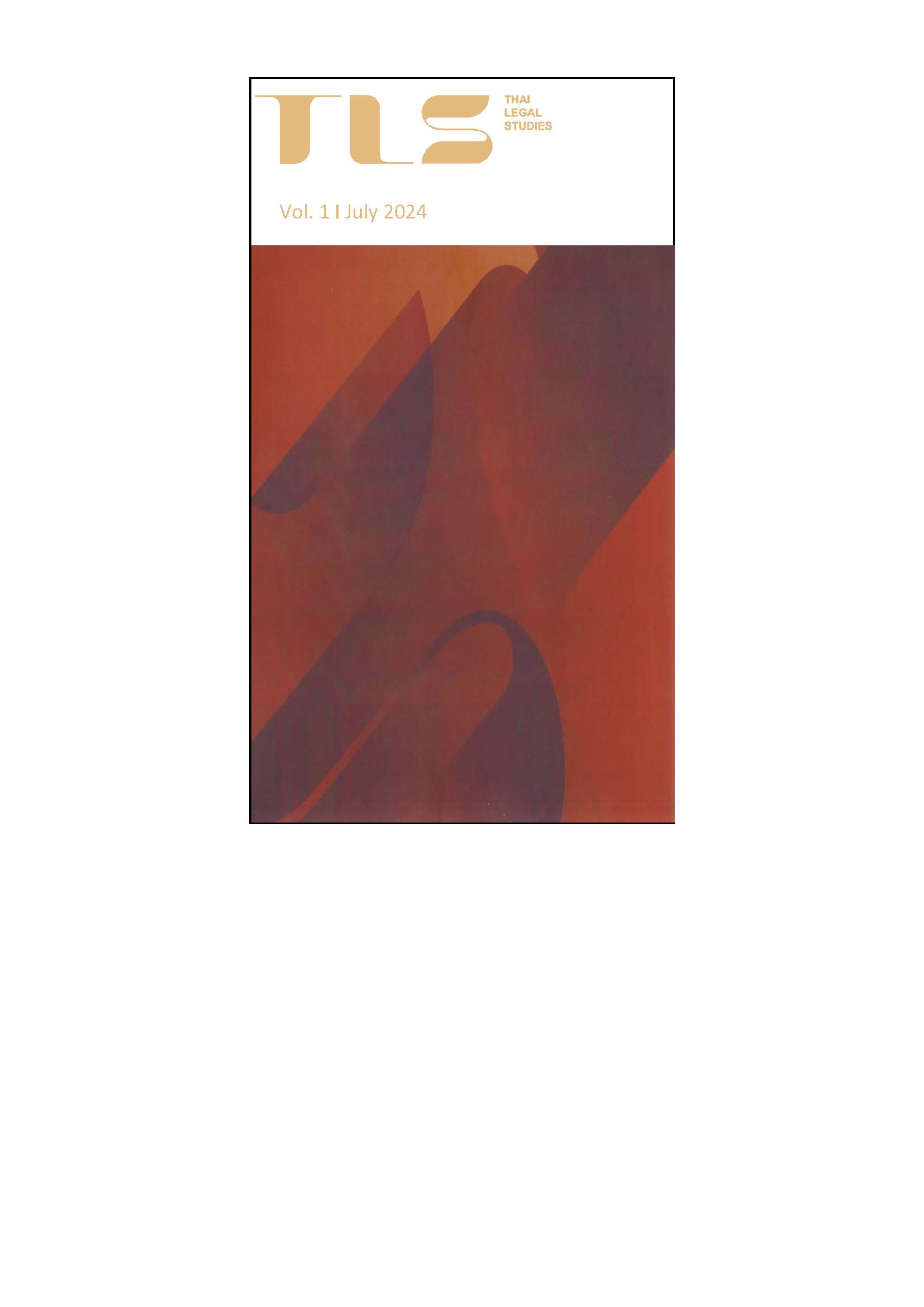Analyzing Thailand’s Amendments to the Civil and Commercial Code on Marriage Equality: Progress, Shortcomings, and the Struggle for LGBTIQAN+ Rights to Family Establishment
DOI:
https://doi.org/10.54157/tls.274227Keywords:
Marriage Equality, Gender Neutral Terms, Primary Parents, SOGIESC RightsAbstract
Thailand’s proposed amendment of the Civil and Commercial Code (“CCC”) on marriage equality, recently passed by the lower house of Parliament on 27 March 2024, marks a historic milestone and represents a significant step towards recognizing the rights of Lesbian Gay Bisexual Transgender Intersex Queer Asexual and Non-Binary+ (LGBTIQAN+) individuals to establish families. This commentary article critically examines the draft legislation through the lens of international human rights law and domestic constitutional principles of equality and human dignity. Situating the Act within Thailand’s international obligations, the article traces the legislative history and highlights the progressive vision of the Civil Society Draft, which developed from the thesis-based research of Chawinroj Teerapatcharaporn, School of Law, Sukhothai Thammathirat Open University (STOU). It commends the shift towards gender-neutral language in marriage eligibility while critiquing the retention of binary “father/mother” terminology as falling short of genuine inclusivity. Drawing from parliamentary debates, the commentary engages with objections raised by religious party MPs, countering them by reasserting the primacy of constitutional equality and secular human rights principles over religious precepts in civil law matters. The article concludes by assessing the Act’s potential impact and the ongoing struggle for fully realizing LGBTIQAN+ family rights, calling for further reform that embraces gender neutrality and equality regardless of sexual orientation, gender identity, gender expression, and sex characteristics (SOGIESC).
References
“Born Free and Equal: Sexual Orientation, Gender Identity and Sex Characteristics in International Human Rights Law.” United Nations, & Office of the High Commissioner for Human Rights (2nd ed 2019). https://www.ohchr.org/sites/default/files/Documents/Publications/Born_Free_and_Equal_WEB.pdf
“Consideration of Reports Submitted by States Parties Under Article 18 of the Convention, Sixth and Seventh Periodic Reports of States Parties Due in 2010: Thailand.” UN Committee on the Elimination of Discrimination Against Women (CEDAW) (29 May 2016) (CEDAW/C/THA/6-7). https://www.refworld.org/docid/582d782f4.html
Feldblum, Chai R. “Protecting LGBTQ Liberty and Religious Liberty.” (2022) 47(1/2) Human Rights Magazine. https://www.americanbar.org/groups/crsj/publications/human_rights_magazine_home/intersection-of-lgbtq-rights-and-religious-freedom/protecting-lgbtq-liberty-and-religious-liberty/
Gerber, Paula, and Joel Gory. “The UN Human Rights Committee and LGBT Rights: What Is It Doing? What Could It Be Doing?” (2014) 14(3) Human Rights Law Review 403–39. https://doi.org/10.1093/hrlr/ngu019
“Go Thai. Be Free.” (Tourism Authority of Thailand New York Office). https://www.gothaibefree.com
“Historic Decision: Council Passes First-Ever Resolution on Sexual Orientation & Gender Identity.” International Service for Human Rights (17 June 2011). https://ishr.ch/latest-updates/historic-decision-council-passes-first-ever-resolution-sexual-orientation-gender-identity/#Votes
Hutton, Christopher. “Legal Sex, Self-classification and Gender Self-Determination.” (2017) 11(1) Law and Humanities 64. https://doi.org/10.1080/17521483.2017.1320037
“Measuring LGBTI Inclusion: Increasing Access to Data and Building the Evidence Base.” United Nations Development Programme (2016). https://globalphilanthropyproject.org/wp-content/uploads/2016/11/Measuring-LGBTI-Inclusion-Research-Paper-July-5-submitted-for-Montevide....pdf
Mott, Woodard King. “Queer Politics: Re-Shaping the Politics of Church and State.” (2022) 13(7) Religions. https://doi.org/10.3390/rel13070663
Newman, Peter A., Luke Reid, Suchon Tepjan, and Pakorn Akkakanjanasupar. “LGBT+ Inclusion and Human Rights in Thailand: A Scoping Review of the Literature.” (2021) 21 BMC Public Health, Article 1816. https://doi.org/10.1186/s12889-021-11798-2
Ojanen, Timo T., James Burford, Adisorn Juntrasook, Athita Kongsup, Titikarn Assatarakul, and Nada Chaiyajit. “Intersections of LGBTI Exclusion and Discrimination in Thailand: The Role of Socio-Economic Status.” (2019) 16(4) Sexuality Research and Social Policy 529–42. https://doi.org/10.1007/s13178-018-0361-x
“The Role of the United Nations in Combatting Discrimination and Violence Against Lesbian, Gay, Bisexual, Transgender and Intersex People.” United Nations Office of the High Commissioner for Human Rights (2019). https://www.ohchr.org/sites/default/files/Documents/Issues/Discrimination/LGBT/UN_LGBTI_Summary.pdf
“Thailand deposits Instrument of Ratification to the International Convention for the Protection of all Persons from Enforced Disappearance (ICPPED).” (Ministry of Foreign Affairs of the Kingdom of Thailand, 16 May 2024). https://www.mfa.go.th/en/content/icpped140524-2?cate=5d5bcb4e15e39c306000683e
“Thailand’s Third UPR Outcome: We Must Not Congratulate the Thai Government!” Manushya Foundation (22 March 2022). https://www.manushyafoundation.org/post/thailand-s-third-upr-outcome-we-must-not-congratulate-the-thai-government
“UN Human Rights Office Congratulates Prominent Thai Academic on Becoming UN’s First SOGI Independent Expert.” UN OHCHR South-East Asia Regional Office (30 September 2016). https://bangkok.ohchr.org/news-release-un-human-rights-office-congratulates-prominent-thai-academic-on-becoming-uns-first-sogi-independent-expert/
United Nations General Assembly (12 July 2018). Report of the Independent Expert on Protection Against Violence and Discrimination Based on Sexual Orientation and Gender Identity (A/73/152).
Vitit Muntarbhorn. “Challenges to Gender Equality in Thailand.” Bangkok Post (8 March 2018). https://www.bangkokpost.com/opinion/opinion/1424306/challenges-to-gender-equality-in-thailand
Sources in Thai
Matichon TV. “(FULL VERSION) วันประวัติศาสตร์ สภาโหวตรับหลักการ ร่าง กฎหมายสมรสเท่าเทียม : Matichon TV.” [ “Short Cut of 1st Reading Debate on Marriage Equality Law.” YouTube (21 December 2023).] https://www.youtube.com/watch?v=O67cPv_Wc3U
กันต์ แสงทอง ภัสสรา บุญญฤทธิ์ รัฐกับศาสนา. ความไม่ชัดเจนของรัฐไทยในความเป็นรัฐโลกาวิสัยหรือรัฐศาสนา. [Kan Sangtong, and Bhasrah Boonyarithi. “State and Buddhism: The Ambiguous State Between Secularism and Religion.”] Journal of Social Sciences and Humanities (2018) 1 Mahamakut Rajavidyalaya University. https://so04.tci-thaijo.org/index.php/JSSMBU/article/view/248737/169021
“ข้อเสนอแนะที่ประเทศไทยได้รับ และคำมั่นโดยสมัครใจภายใต้กลไก Universal Periodic Review (UPR).” กระทรวงการต่างประเทศ. [“Thailand’s Accepted Recommendations and Voluntary Pledges Universal Periodic Review (UPR) 3rd Cycle.” Ministry of Foreign Affairs.] https://humanrights.mfa.go.th/th/upr/report-3/report08.php
“บันทึกการประชุม คณะกรรมาธิการวิสามัญพิจารณาร่างพระราชบัญญัติแก้ไขเพิ่มเติม ประมวลกฎหมายแพ่งและ พาณิชย์ (ฉบับที่ ..) พ.ศ.... “ สภาผู้แทนราษฎร 3 มกราคม B.E. 2567 ประชุม ครั้งที่ 1. [“Minutes of the Meeting of the Ad Hoc Committee for Considering the Draft Act to Amend the Civil and Commercial Code (No. ..) B.E. ....” House of Representatives (3 January 2024) Meeting No. 1.] https://web.parliament.go.th/view/282/บันทึกการประชุม/TH-TH#
“บันทึกการประชุม คณะกรรมาธิการวิสามัญพิจารณาร่างพระราชบัญญัติแก้ไขเพิ่มเติม ประมวลกฎหมายแพ่งและพาณิชย์ (ฉบับที่ …) พ.ศ. …” สภาผู้แทนราษฎร 21 กุมภาพันธ์ B.E. 2567 ประชุม ครั้งที่ 8. [“Minutes of the Meeting of the Ad Hoc Committee for Considering the Draft Act to Amend the Civil and Commercial Code (No. ...) B.E. ...” House of Representatives (21 February 2024) Meeting No. 8.] https://web.parliament.go.th/view/282/บันทึกการประชุม/TH-TH#
“ประชาชาติยืนยันไม่รับสมรสเท่าเทียม ชี้ขัดหลักอิสลาม บอกต้องเป็นชาย-หญิงเท่านั้น หวั่น 30 ปีข้างหน้ามีแต่ผู้สูงอายุ.” [“Prachachat Party Confirms Not Accepting Marriage Equality, Pointing Out That It Contradicts Islamic Principles, Saying It Must Be Only Between Men and Women, Fearing that in 30 Years There Will Be Only Elderly People.”] The Standard (21 December 2023). https://thestandard.co/equal-marriage-law-211266-2/
“เปิดซองคำถาม . . . นโยบายเพื่อความหลากหลายทางเพศ พรรคไหนมงลง!” [“Opening the Envelope of Questions . . . Which Party Will Embrace Policies for Gender Diversity?”] The Active (12 April 2023). https://theactive.net/data/lgbtqna-rights-policy/
“แผนการปฏิบัติตามข้อเสนอแนะที่ไทยตอบรับ และคำมั่นโดยสมัครใจภายใต้กลไก.” กระทรวงการต่างประเทศ. [“Implementation Plan for Thailand’s Accepted Recommendations and Voluntary Pledges, Universal Periodic Review (UPR) 3rd cycle.” Ministry of Foreign Affairs.] https://humanrights.mfa.go.th/upload/แผนการปฏิบัติตามข้อเสนอแนะที่ไทยตอบรับและคำมั่นโดยสมัครใจ.pdf
“รวมข้อมูลความเคลื่อนไหวการแก้ไขประมวลกฎหมายแพ่งฯ เพื่อ #สมรสเท่าเทียม.” [“Compilation of Information on the Movement to Amend the Civil Code for #MarriageEquality.”] iLaw (30 January 2023). https://www.ilaw.or.th/articles/17971
“ลุ้น #สมรสเท่าเทียม เข้าสภาฯ วาระสอง 27 มี.ค.นี้.” [“Looking Forward to #EqualMarriage Entering the House of Representatives for the Second Term on 27 March.”] The Active (19 March 2024). https://theactive.net/news/gender-sexuality-20240318/
ศิริชนก วิริยเกื้อกูล. “สิทธิการสมรสระหว่างบุคคลเพศเดียวกัน. กลุ่มงานบริการวิชาการ 3 สำนักวิชาการ.” [Sirichanok Wiriyakeokul. “The Right to Same-Sex Marriage.” Academic Services Group 3, Bureau of Academic Affairs, Parliament.] https://www.parliament.go.th/ewtadmin/ewt/parliament_parcy/ewt_dl_link.php?nid=47682
“สภารับหลักการร่างแก้กฎหมายแพ่ง #สมรสเท่าเทียม และร่างพ.ร.บ.คู่ชีวิต จับตาต่อวาระสอง-สาม.” [“Reviewing the Draft Principles of the #EqualMarriage Law and the Draft Civil Partnership Bill, Watching Over the Second and Third Readings.”] iLaw (15 June 2022). https://www.ilaw.or.th/articles/5259
“สมรสเท่าเทียมเป็นของประชาชน” คุยกับ ‘วาดดาว’ ชุมาพร แต่งเกลี้ยง ในวันที่ผู้คนส่งเสียงถึงความหลากหลาย.” [“‘Equal Marriage Is for the People’: Discussing With ‘Waad Dao’ Chummaporn Taengkliang on the Day When People Express their Voices about Diversity.”] Thairath Plus (22 June 2023). https://plus.thairath.co.th/topic/politics&society/101692
“สู่เลือกตั้ง ‘66: หาเสียงนโยบาย ‘LGBT-สตรีและเด็ก’ รัฐโอบรับหรือการตลาดขายฝัน?” [“The Road to the ‘66 Election: Seeking Votes with the Policy ‘LGBT-Women and Children’ – State Support or Market of Dreams?”] The Opener (25 January 2023). https://theopener.co.th/node/1560
“เส้นทาง 22 ปี สู่ “สมรสเท่าเทียม” อีกขั้นสู่ความเท่าเทียม.“ [“22-Year Journey to ‘Equal Marriage’ Takes Another Step Toward Equality.”] Thai PBS (21 December 2023). https://www.thaipbs.or.th/news/content/335137
อานนท์ มาเม้า. ”LGBTQIA+ จะเป็น ‘บุพการี’ ของใครสักคนได้ไหม.” [Arnont Manmout. “Can LGBTIQA+ Individuals Be “Parents” To Someone?”] The Standard Media (8 April 2024). https://thestandard.co/opinion-lgbtqia-parenting/
“ ‘อุ๊งอิ๊ง’ หวังไทยเป็นเจ้าภาพ World Pride 2030.” [“Ung Ing, Head of Pheu Thai Party Hopes Thailand Will Be the Host Country for the World Pride 2030.”] Komchadluek (14 May 2024). https://www.komchadluek.net/news/politics/574718
Published
Issue
Section
License
Copyright (c) 2024 Nada Chaiyajit

This work is licensed under a Creative Commons Attribution 4.0 International License.
Authors retain copyright and publishing rights without restrictions, but grant Thai Legal Studies the right of first publication in English and to distribute the work under a Creative Commons Attribution 4.0 International Public License (“CC BY 4.0”). It allows others to freely share the work, including the making of translations. There is no charge or fee for readers to immediately view published articles or content, and users are allowed to read, download, copy, distribute, print, search, link to the full texts of the articles, or use them for any other lawful purpose, without asking prior permission from Thai Legal Studies or the author(s), the only requirement being that an acknowledgement is given of the work’s authorship and its initial publication in English by Thai Legal Studies.







